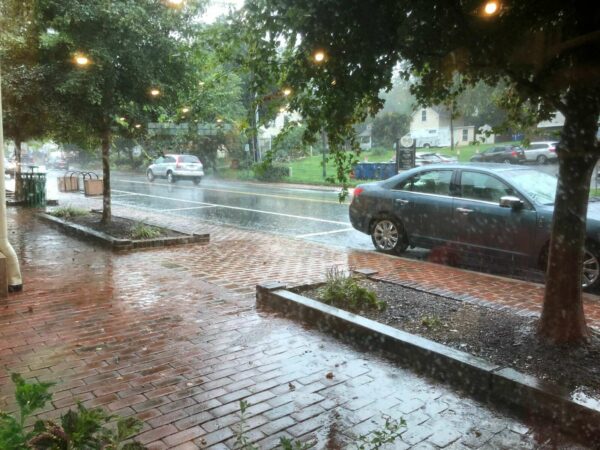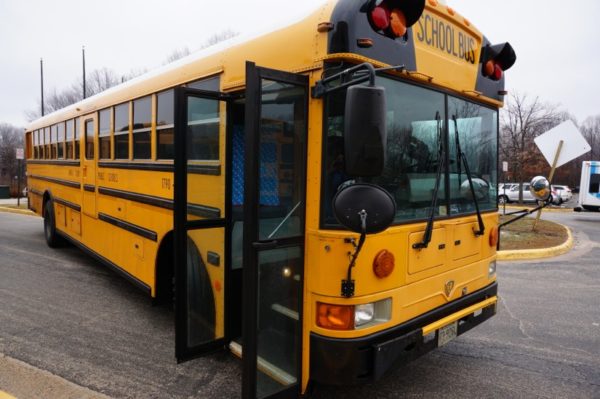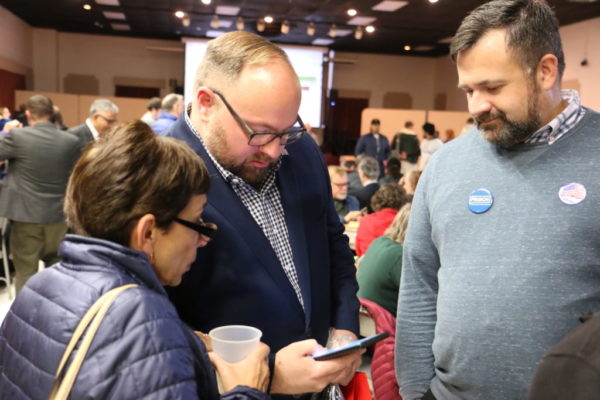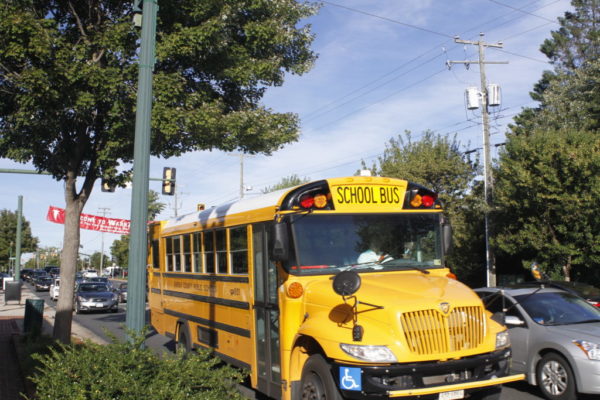Help Name Former Container Store — Celebrate Fairfax is turning the former Container Store at 8505 Leesburg Pike in Tysons into a community event venue whose name will be determined by a social media poll. The options are Tysons Commons, Tysons Collective, Social District at Tysons, and The PARC (People, Art, Recreation, and Community) at Tysons. [Celebrate Fairfax Festival/Twitter]
Inova-Tested Drug Helps COVID Patients — “A drug tested at Inova Health System has shown to improve clinical outcomes in hospitalized COVID-19 patients who required supplemental oxygen. The Phase 2 clinical trial evaluating the safety of fostamatinib was conducted on behalf of Rigel Pharmaceuticals Inc…Results were published Wednesday in Clinical Infectious Diseases, an official publication of the Infectious Disease Society of America.” [Inside NoVA]
Falls Church to Get First Electric School Buses — “FCCPS is one of 19 Virginia school divisions receiving a grant to replace diesel school buses with new electric buses. The grant announcement came last Thursday, in a news release from the governor’s office. FCCPS will receive $530,000 for two electric buses from the Volkswagen (VW) Environmental Mitigation Trust.” [Falls Church News-Press]
Local Nonprofit Names New Leader — “Vienna-based Langley Residential Support Services, a nonprofit serving adults with developmental disabilities, has named a new executive director. Langley Residential’s board hired Maureen K. Gum as executive director after she served as interim executive director.” [Patch]
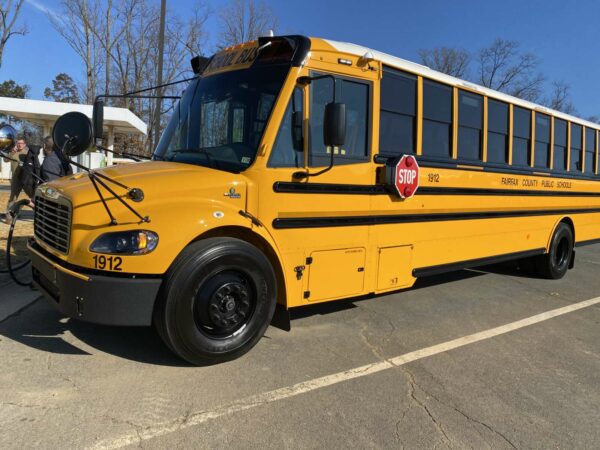
Fairfax County Public Schools will soon add another 10 electric school buses to its fleet, thanks to a new $2.65 million state grant.
19 school districts, including FCPS, will collectively receive more than $10 million in the latest round of allocations from Virginia’s Volkswagen Environmental Mitigation Trust — enough to replace 83 diesel school buses with electric and propane-fueled vehicles, Gov. Ralph Northam announced last Wednesday (Aug. 19).
“Virginia’s investments in electrifying the school bus fleets is an important and critical part of our comprehensive approach to reducing pollution,” Virginia Department of Environmental Quality Director David Paylor said in the news release. “Collectively, the replacement of these school buses is calculated to reduce carbon dioxide emissions by 10,000 tons per year, and will save one million gallons of diesel fuel, equivalent to removing 2,000 cars from the road.”
Administered by Department of Environmental Quality, the Volkswagen trust comes from Virginia’s $93.6 million share of the $2.7 billion settlement that the automobile manufacturer agreed to in 2016 after violating the Clean Air Act by cheating vehicle emissions tests.
Virginia announced the first round of funding from the trust on May 7, awarding over $9.4 million to help local governments purchase electric vehicles for their fleets. Fairfax County got more than $4 million for shuttle buses, waste and recycling trucks, and a truck for its public library system.
FCPS currently has eight electric buses that were placed in service this past May. The first bus arrived in January as part of a pilot program developed by Dominion Energy, which rolled out 50 buses across the state with plans to replace all diesel school buses with electric ones by 2030.
However, the future of Fairfax County’s transition to electric school buses has become a little hazier after the Virginia House of Delegates rejected an expansion of Dominion’s program that would’ve added 1,000 more electric school buses, a sign of legislators’ growing wariness of the utility company’s influence.
During its spring special session, the General Assembly voted to create an Electric Vehicle Grant Fund to help with the costs of adding electric school buses. Northam signed the bill into law, but the program has no funding yet.
Dominion confirmed that the newly awarded DEQ grants are unrelated to its program, which covered the difference in cost of an electric bus versus a diesel one as well as the cost and installation of charging stations.
“Children deserve clean transportation to school and we’re excited to see Virginia moving that way,” Dominion spokesperson Peggy Fox said. “The goal with our innovative program was to accelerate the adoption of electric school buses, so we’re thrilled to see more of these clean-running buses with zero emissions rolling out across Virginia.”
The utility says it is still offering to install charging stations for school districts for free in exchange for the ability to return stored energy back into the electric grid when the buses are idle and the chance to buy the bus batteries after the vehicles pass their life span.
“We will be involved if schools systems chose so,” Fox said in an email.
FCPS says its transportation department “continues to evaluate” its existing electric buses and work with vendor Thomas Built Buses to make adjustments.
While shifting to electric buses is expected to reduce operational and maintenance costs in the long run, the district’s transition is currently limited by the availability of funding and charging infrastructure, which affects where the buses can be assigned.
“As more funding opportunities become available, as the technology is refined for school division needs, and as charging infrastructure becomes readily available, FCPS plans to transition its fleet of 1,625 buses to electric,” FCPS spokesperson Julie Moult said by email.
The 10 new buses funded by the DEQ grant are scheduled to arrive in March 2022.
“Operation and maintenance of the electric buses are being monitored and evaluated for efficiency of operation and cost savings,” Moult said.
Fairfax County Public Schools is getting its first electric school bus today as part of a statewide initiative led by Dominion Energy.
The bus is expected to arrive at the Stonecroft Transportation Center in Chantilly. It is the first of eight vehicles that FCPS will receive from Dominion in an initial deployment of 50 buses throughout Virginia.
FCPS says it anticipates getting the remaining seven buses by the end of January.
Made by Thomas Built Buses, the new vehicles will join Fairfax County’s fleet of approximately 1,625 diesel-fueled school buses, one of the largest in the country.
“Electric school buses in FCPS will benefit not only the school division and its community, but the entire national capital area,” FCPS says. “…They will help reduce carbon emissions, serve as a resource for national emergency planning efforts, and provide stability and capacity to the grid with meeting increasing energy demands.”
While electric buses are more expensive to purchase than diesel ones, they are cheaper to maintain and operate. FCPS is covering the difference in the initial cost with a grant from Dominion Energy, which also funded the installation of electric charging infrastructure at the Stonecroft facility and is responsible for maintaining the equipment.
FCPS says training for bus drivers, maintenance technicians, and other staff will start once the first bus arrives. The vehicles will undergo testing before being assigned to routes in early to mid-April, though whether there will be any students for them to transport at that time remains to be seen.
The arrival of Fairfax County’s first electric bus is a welcome step forward for community members and public officials who have been advocating for a transition to electric vehicles, citing health and financial benefits as well as environmental ones.
One of the most prominent advocates for electric school buses has been the Fairfax County branch of the national climate advocacy group Mothers Out Front, which launched a campaign in 2019 calling on FCPS to commit to converting its entire fleet to electric power by 2024.
“We are so excited for Fairfax to get its electric school buses on the ground and running,” Mothers Out Front Fairfax co-leader Barbara Monacella said in a statement. “…Every electric school bus we add to our fleet reduces the air pollution from diesel that harms our kids’ health, and brings us closer to our goal of converting every bus in order to reduce emissions and fight climate change.”
The community advocacy group has teamed up again with Del. Mark Keam (D-35th) on legislation that would create a state fund for school districts to purchase electric buses, a move aimed at addressing concerns about the amount of control Dominion has over the current initiative.
Last year, lawmakers opted to pursue the utility company’s pilot program instead, but Monacella says Keam will reintroduce his bill when the Virginia General Assembly convenes for its 2021 session on Wednesday (Jan. 13).
“We applaud the buses Fairfax has added, and we hope to add more through the state grant fund in the future,” Monacella said. “With every electric bus we add, we move the needle for our kids’ health and their future in the face of climate change.”
Tysons’ new school board member supports efforts to have Fairfax County Public Schools go green, but has concerns about how the goals are being met.
Karl Frisch, the newly elected school board representative for the Providence District, held office hours with community members last Friday (Feb. 13) in Merrifield to discuss the progress of ongoing initiatives.
The changes include Dominion Energy testing eight electric school buses around Fairfax County and the county installing solar panels at roughly two dozen schools in the Providence District, according to Frisch.
The decision to install solar panels was made possible by Fairfax County’s new Solar Power Purchase Agreement (PPA), according to Frisch’s newsletter.
Around 60% of Providence District public schools have cleared the first step to receive solar panels, Frisch said.
As for the school buses, Frisch said while running for office that they were one of his top goals. (The initiative also supported by Del. Mark Keam (D-35th District) and groups like Mothers Out Front Fairfax.)
Now, as the program is becoming a reality, he said it is a “fantastic” opportunity for the district.
“Dominion Energy will cover the difference in cost so that school districts pay no more for electric buses than they would for diesel models,” according to the FCPS website, which added that the company will also cover the cost of the charging stations.
For the news buses, FCPS will only be paying around $150,000 of the $325,000 for an electric school bus, plus the added cost of seat belts and the cost of electricity to run the buses in place of diesel fuel, Peggy Fox, a Dominion Energy spokesperson, said.
By replacing diesel school buses with an electric option, FCPS will save 60% on maintenance costs, according to Fox.
But, Frisch also told Tysons Reporter that he is hesitant about Dominion’s potential long-term control over the bus program and said he would prefer to see a competitive bidding process before FCPS agrees to work with the energy company to electrify the school’s remaining 1,600 bus fleet.
Fox said that Dominion approached FCPS with the initial opportunity and those within the district were enthusiastic to accept the offer. “We are doing it on our dime because we think it is so great,” she said.
An electric bus bill that was originally sponsored by Keam was shut down — the bill that would have allocated more state funds toward this initiative and eased the pressure to involve Dominion Energy, according to Frisch.
“The bill that made it through the House [of Delegates] was a different bill,” Frisch said. “If that’s what ends up becoming law, then our electric school buses will be tied to the hip to Dominion.”
Despite the concern over the cost, Frisch said he still supports the initiative and wants to move forward toward carbon-neutrality.
“If this is the only way we can get it done — fine,” he said. “But it is not the best way to do it.”
By 2030, Dominion wants 100% of the school buses in the company’s service zone in Virginia to be transitioned into an electric fleet, according to Fox. “We are thrilled the legislature is helping to move this forward,” she said.
Both Frisch and Fox agree that electric buses will be healthier for the school kids who depend on them and will help ease the carbon imprint on the environment.
Going forward, Frisch said he isn’t sure when the electric school buses will officially join the fleet, but Fairfax County said they’d likely hit the road by the end of the year.
Updated 3 p.m. — Includes information from FCPS about the school buses.
Eight electric school buses are set to roll into Fairfax County before the end of the year.
Dominion Energy announced today (Thursday) that Thomas Built Buses was selected in December as the vendor for the 50 buses for the first phase of the project.
Last year, Dominion Energy unveiled its initiative to bring 50 school buses to 16 counties and cities to replace diesel-powered buses by the end of 2020.
Fairfax County will be a part of the first batch of electric school buses Dominion Energy is working to add across Virginia.
“This is an innovative, sustainable solution that will help the environment, protect children’s health, make the electric grid stronger, and free up money for our schools,” Dominion Energy Chairman, President and CEO Thomas Farrell, II, said in the press release.
Fairfax County, which currently has a fleet of 1,625 diesel-fueled buses, will get eight electric ones, with Dominion Energy covering the difference in cost between the electric and diesel buses, according to Fairfax County Public Schools (FCPS).
“Dominion will also subsidize the cost of [the] necessary charging infrastructure,” FCPS said.
More from the press release:
The buses also provide environmental and health benefits through reduced emissions and reduce operation and maintenance costs for schools by up to 60 percent.
Phase two of the project, with state approval, would expand the program to bring at least 1,000 additional electric school buses online by 2025. Once phase two is fully implemented, the buses’ batteries could provide enough energy to power more than 10,000 homes.
Phase three would set the goal to have 50 percent of all diesel bus replacements in Dominion Energy’s footprint be electric by 2025 and 100 percent by 2030.
“Adding electric school buses in our fleet is consistent with the environmental focus of Fairfax County and the school division,” FCPS Superintendent Scott Brabrand said in the FCPS press release. “Before this new partnership, the availability of electric school buses was very limited and cost was prohibitive for school divisions. This exciting new Dominion Energy initiative is moving us forward and is making electric school buses a reality.”


